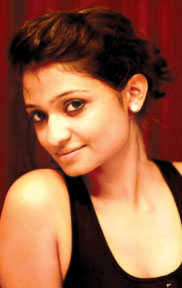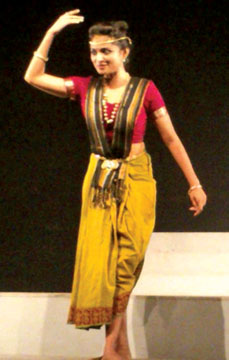Swati Simha's odyssey in the theatre world
By Dilshan Boange
On April 1 two very talented young actresses from the FLAME School of
Performing Arts in Pune, India brought to life two compelling solo acts
as part of the line up of performances of the second Colombo
International Theatre Festival (CITF) held from March 28 to April 4. The
Associated Newspapers of Ceylon Limited was the official print media
partner of the second CITF.
|

Swati Simha |
The solo performances brought to life two remarkable characters to
critically interpret two prominent female roles from the two best known
Indian epics -the Mahabharata and the Ramayana. Holding their presence
compellingly on stage and doing justice to the characters they
interpreted through the medium of theatre, Devika Kamath delivered a
characterisation of Draupadi from the Mahabharata, and Swati Simha gave
expression to the character of Shoorpanakha from the Ramayana.
In this first instalment of a two- part interview via email with the
two young actresses they discuss facets of their formal academic
education and training in theatre as well as how their respective solo
acts were developed and what they envision as their career paths in the
dynamic and challenging world of drama and theatre, Swati Simha shares
her insights with Montage.
Excerpts of the interview:
Question: What sort of exposure about professional theatre, in
terms of theory and practice, did you get through your course syllabi at
FLAME School?
Answer: The FLAME School of Performing Arts (FSPA) was a
holistic theatre experience for me. Although I majored in Acting, my
take back from FSPA has been more extensive. Theatre really has a lot of
aspects to it and when you allow yourself to delve deeper, you realise
it has much more to it than what meets the eye. At FSPA, I felt like I
was driven up to the sea and allowed to choose in which direction I
wanted to swim.
We had classes in a wide range of theory subjects starting from
Classical Indian Drama to Politics of Theatre practice to Drama in the
context of world history. Subsequently we had a wide range of practical
workshops given to us by national and international theatre faculty with
productions ranging from absurd plays such as Bald Soprano (Directed by
Jeffery Sichel) to Indian folk musicals such as Ladi Nazariya (Directed
by Prasad Vanarase with Music Directed by Sameer Dublay). Like most good
colleges around the world FSPA too had a great faculty we could easily
approach and talk about things that interested us.
I was able to gauge the measure of professionalism in our work when
we went out to festivals within and outside our country. We were
definitely up to the mark, if I may say so.
Solo performances
|

Swati Simha in a dance pose
|
Q: The solo performances that went on the boards as part of
the second Colombo International Theatre Festival (CITF) were originally
developed as final year thesis projects at FLAME School. Can you give
some insight and background information about how the characters were
chosen and how the projects were developed?
A: The two major assignments in our final year comprised a
Solo Act and a full-scale production.
For the full-scale production we were allowed to choose whether we
wanted to direct and/or write it ourselves or take an already existing
script and have someone else direct it or devise it with other students.
In "Acting Solo" we were asked to choose a character from either the
Ramayan or the Mahabharat (two great epics of India with characters and
plots most Indians are familiar with) and develop a solo act based on
the chosen character. The charm of the characters in these epics is
their ability to lend themselves to several interpretations depending on
how you choose to look at them. Precisely why such literary pieces of
works are called classics and have stood the test of time!
I chose the character Shoorpanakha (or as I learnt in Sri Lanka -
Supurnika), King Ravan's sister. Initially I chose it because I thought
it would be challenging to explore a "negative" character owing to my
petite physique and childish demeanour.
When I started searching for different versions of Ramayana (Apart
from the popular stories I heard as a child or read in Amar Chitra
Katha), I realised there was more to her character than the ugly and
vulgar hag she is dubbed to be.
I wanted to put her into the context of the modern Indian society I
live in and talk about the less spoken, the sexuality of the modern
Indian woman. I began to see the entire mythical epic like history that
had been exaggerated over the years (e.g: Ravan's ten heads, an
exaggeration of how intelligent he was...). Therefore I found several
interesting things I could speak about Shoorpanakha.
As for the process, I was more comfortable writing the entire act
first and then deciding how to put it up on stage. I had decided I was
going to use very little props and make it simple in terms of
production.
Prof. Prasad Vanarase helped me develop it into a performance,
questioned me and provoked me while I was conceptualiSing it and later
took up the responsibility of lighting and staging and allowed me to
concentrate on acting. "Sita Sings the Blues" by Nina Paley was a great
inspiration!
Lankan factor
Q: What do you feel about making your performances part of
CITF this year? Did the Sri Lankan factor become a conscious element on
how you thought of your performance here and how it will connect with an
audience outside India?
A: When I wrote the play I had taken for granted that people
knew The Ramayana. I hadn't planned a performance in Lanka or outside
India when I had developed the play, but I had spent some time thinking
about what a Lankan would think about the character of Shoorpanakha when
I was writing the play. The first show as part of CITF was attended by
the young audiences of the British School in Colombo. I realised how
this performance didn't work for those who didn't know The Ramayan.
The second show was attended by local Sri Lankans and I was comforted
by the response. Some women thanked me for bringing out this perspective
and told me that only Shoorpanakha's love for Rama was true love!
I loved performing there. There was this constant feeling of
discovery even on stage when I was performing to Sri Lankans about a
princess of their land, dubbed as an adulteress in our land. I enjoyed
realising the implication of my lines as I spoke them to the Sri Lankan
audience, initially perhaps unintended in that socio-political context.
Now it is time to develop the work with all the realisation and
feedback.
Professional theatre
Q: How much potential do projects developed by students as
part of the study course while in school have in the larger context of
professional theatre? For example, do you see your respective acts as
scripts that can be developed into individual shows that can meet the
demands of a professional theatre circuit?
A: Making a living out of performing something like this is
very difficult. I don't think there is any commercial value to a
performance like this. If by professional theatre you mean
self-sustaining theatre that can meet (at least) my daily expenses, I
think it is very difficult.
The cost of production though is very less and I could develop it
into an individual show of course, but I think I still need to learn to
be entrepreneurial about it. Maybe that will come as I go on to do more
Professional theatre.
Q: What made you choose drama and theatre as your stream of
higher studies, and as thespians what do you envision as your career
goals?
A: I met this Broadway actress once in Manchester and she told
me she didn't choose theatre, theatre chose her and ever since she has
been loyal to it. I guess that's my story as well. I stumbled about this
path and fell in love with it! I am going to Shanghai Theatre Academy,
China this fall to broaden my perspective on the world and the world of
Theatre.
About careers, goals, visions and the future... I am trying to clear
the mist and see more clearly. |


